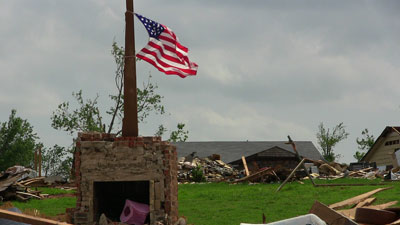According to a recent report, Kentucky ranks as one of the top 10 states as having the most natural disasters. Since 1953, there have been 56 disaster declarations. The disaster roster in Kentucky has included landslides, mudslides and rockslides, along with flooding and tornadoes.
The state was ripped up in 2008 by the remnants of Hurricane Ike. Another major disaster declaration involved a record snowfall in late 2004, and yet another stemmed from a 1981 series of chemical explosions in Louisville sewers.
Flooding on the Ohio and Mississippi River are all common occurrences as recorded in the flood of 1937. And we can never forget the 1811-12 New Madrid earthquakes. Fires, coal mining disasters, and transportation accidents may also affect the church and congregation indirectly.
Natural disasters can occur at any time, any place. This article focuses on plans and preparation a church should have in place to protect a congregation during a service or church sponsored event. Although several events are classified as natural disasters, let’s look at three that may occur without warning—or very little notice: tornadoes, lightning strikes, and earthquakes.

Coy Webb, director of Kentucky Baptist Disaster Relief, said, “In order to protect a congregation during a natural disaster, a church should have a plan of being prepared. Our organization works with churches to develop such a plan that can save lives and safeguard people.”
Webb suggested taking an emergency warning seriously. Where in the church would be the best protection? Are nursery workers trained in knowing what to do?
In March 2012, West Liberty, Ky., experienced major damage from a tornado. First Baptist and Grace Baptist churches both received damage. New Hope Baptist Church, outside the main line of the tornado, was spared. With their facilities intact, this allowed New Hope to feed volunteers, serve as a center for distribution and minister to the area. Willie Dybas, pastor of New Hope, said the church went into a “servant mode” by helping those in need.
Plan and prepare
What if your congregation was worshiping together and a tornado siren sounded? Or the fire alarm went off? Or, lightning struck the church during a service? Or, an earthquake?
Would people looked to each other and wonder who would take the lead? What about the babies in the nursery? Or the elderly and those with special needs? Is there a plan in place for natural disasters that may come with little, or no warning?
Having a plan and preparing for these emergencies can save lives and help people survive.
Earthquake preparedness
Even with today’s technology, earthquakes can happen with little or no warning. Experts advise these precautions:
• Drop
• Cover your head and neck with your hands
• Move under a table or desk, hold on
• A guide for those with disabilities includes: If possible, drop to the floor, cover head, hold on; using a cane, lower yourself to the floor, cover head, hold on; using a walker or wheelchair, lock the device, cover head, hold on.
Lightning preparedness
No place is safe outdoors when lightning is present. If thunder is present, lightning is close enough to strike.
Indoors:
• Do not use corded phones, computers and other electrical equipment
• Avoid plumbing, including sinks, baths and faucets
• Avoid windows, doors and open porches
• Do not lie on concrete floors or lean on concrete walls
Outdoors:
If your church is involved in an outdoor activity, such as a sports event or picnic:
• Never stand under an isolated tree
• Stay away from elevated hills, peaks or ridges
• Avoid bodies of water
• Stay away from objects that conduct electricity (wire fences, power lines, etc.)
For tornado preparedness tips, see related story by Coy Webb.
Keeping your congregation safe
• Plan tornado drills for children and youth. Knowing how to follow directions and not panic is essential.
• Prepare a tornado emergency plan, including access to a “safe shelter” in the building for those in attendance. A basement, hallway, or small room without windows is recommended.
• Plan for evaluation of the nursery, elderly, and those with special needs.
• Have fresh batteries and a battery-operated TV, radio or internet-device to stay updated on the latest emergency weather information.
• If a service is underway and threatening weather is expected, have trained personnel in contact with the local emergency weather station.
General safety tips before a disaster happens
Be prepared and appoint trained personnel to handle these situations.
• Cut off gas valve to avoid leeks and explosions (Check with gas company for information.)
• Turn off electrical shutoff. Shut off breakers or pull out fuses in the breaker or fuse box. (Check with local electric department for information.)
Develop and print out an emergency communication plan for your church. Snail mail or email to every home in your congregation.
Carolyn Tomlin writes for the Christian magazine market and teaches the Boot Camp for Christian Writers.
Carolyn Tomlin